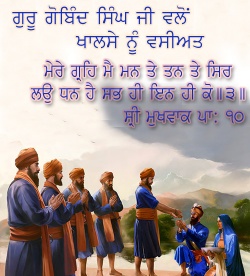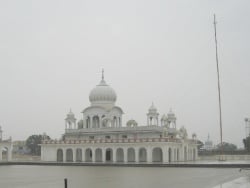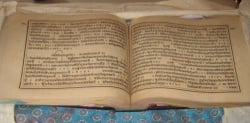Khalsa Mahima (Dasam Granth)
| Khalsa Mahima (Dasam Granth) | |
| Bani Name : | Khalsa Mahima |
| Book Name : | Dasam Granth Sahib |
| Structure : | 3 stanzas and 1 couplet (Dohra). |
| Writer : | Guru Gobind Singh |
| Composed at : | Kapal Mochan |
| Other Info: | Praise of Khalsa |
Khalsa Mahima of Dasam Granth, is a religious hymn in praise of Khalsa, composed by Guru Gobind Singh, is present in second sacred scripture of Sikhs, The Dasam Granth .
- This Composition contains comparative analysis of two religious figures Khalsa and Hindu Pundit.
- This content of composition is different from Khalsa Mahima composition present in Sarabloh Granth.
- This Composition contains three stanzas in one Swaiya and a couplet (Dohra).[1]
- The most important point of this composition is the transfer of will by Guru Gobind Singh to Khalsa warriors.
History
At Kapal Mochan, Guru Gobind Singh gave robes of honour(Siropa) to warriors who fought in Battle of Bhangani and other Sikhs. There was a traditional way of giving honor(Siropa) to Brahmin before giving to others. When Guru Gobind Singh started giving Siropa, he mistakenly forge to give it to Head priest, refereed as Mishar Ji, and started distributed among warriors and Sikhs. Mishar Ji felt insulted with this, when Guru Sahib noticed that Mishar Ji looks anxious then he politely said that he did not ignored him knowingly, as these Sikh warriors do same work of Brahmins(learning and preaching Spiritual Wisdom). That's why for him they are above Mishar Ji because where they learn and preach Spiritual wisdom to Mankind(like Brahmins) there they also fight like warriors(Kashatriyas) in battlefield and lay down there lives .
Guru Gobind Singh also announced that he would be fond of giving donations to these Khalsa because only these Sikh warriors values the given donations and use it appropriately for Mankind. He also announced his purpose of taking Human body is to create Khalsa Panth(Under directions of Hukam). When Mishar Ji heard all this, he became angry and when he actually discovered on what Guru ji said, he wept on the fact that people like him have left even deeds of A Brahmin and turned greedy, Ritualistic and lost the Wisdom (Knowledge of Brahm) and these Sikhs who are Brahmin as well as Kashatriyas by deeds are going to replaced them in realm of religion.
Facts
- This composition praises Khalsa Army.
- It was composed in Kapal Mochan after Battle of Bhangani when Guru Gobind Singh was providing robes of honor to his warriors and was address to Mishar, Hindu Scholar. It is also believed that the composition was addressed to Pandit Kesho Dutt, a Hindu scholar, on the conclusion of Yagna at Naina Devi[1] but Yagna is not treated as Sikh ritual due to this claim is highly vague.
- The second part of this composition is recited among sikhs in Kirtans:
ਜੁੱਧ ਜਿਤੇ ਇਨ ਹੀ ਕੇ ਪ੍ਰਸਾਦਿ ਇਨ ਹੀ ਕੇ ਪ੍ਰਸਾਦਿ ਸੁ ਦਾਨ ਕਰੇ ॥
ਅਘ ਅਉਘ ਟਰੈ ਇਨ ਹੀ ਕੇ ਪ੍ਰਸਾਦਿ ਇਨ ਹੀ ਕ੍ਰਿਪਾ ਫੁਨ ਧਾਮ ਭਰੇ ॥
ਇਨ ਹੀ ਕੇ ਪ੍ਰਸਾਦਿ ਸੁ ਬਿੱਦਿਆ ਲਈ ਇਨ ਹੀ ਕੀ ਕ੍ਰਿਪਾ ਸਭ ਸ਼ੱਤ੍ਰੁ ਮਰੇ ॥
ਇਨ ਹੀ ਕੀ ਕ੍ਰਿਪਾ ਕੇ ਸਜੇ ਹਮ ਹੈਂ ਨਹੀ ਮੋਸੋ ਗਰੀਬ ਕਰੋਰ ਪਰੇ ॥੨॥ - Guru Gobind Singh had given equal status to Khalsa when he say eulogizing the khalsa that it is because of khalsa that he has been what he is.[2]
- Guru Gobind Singh ji conveyed that if he is willing to donate anything that he will donate to Khalsa rather than Hindu Brahmins because Khalsa Values the given things by using it in preaching Gurmat thoughts, use in charity for poor and needy, give food to hungry and purchase arms for preventing Sikhism and fight against tyranny.
- This hymn sanctifies the Varna (Hinduism) classification and stresses that Brahmins should also fight like Kshatriya and Kshatriya should also learn and preach wisdom of Almighty and both characters are played by Khalsa. For instance, Pundit Kirpa Ram was brahmin who preached Gurmat thought and also fight and died in Battle of Chamkaur like Kashatriya.
Hymn
| Sri Dasam Granth Sahib (ਦਸਮ ਗ੍ਰੰਥ ਸਾਹਿਬ) |
| Banis |
| Jaap - Akal Ustat - Bachitar Natak - Chandi Charitar Ukat(i) Bilas - Chandi Charitar 2 - Chandi di Var - Gyan Parbodh - Chobis Avatar - Brahm Avtar - Rudar Avtar - Sabad Patshahi 10 - 33 Swaiyey - Khalsa Mahima - Shastar Nam Mala - Ath Pakhyan Charitar Likhyate - Zafarnama - Hikayats |
| Other Related Banis |
| Bhagauti Astotar - Ugardanti - Sri Kaal Chopai - Lakhi Jungle Khalsa - Asfotak Kabits - Sahansar Sukhmana - Vaar Malkauns Ki - Chandd Patshahi 10 |
| History |
| Historical Sources - Memorials - Anti Dasam |
| Philosophical aspects |
| Idol Worship - Pilgrimages - Chandi - Triya - Shastar |
| Scholar Views |
| Singh Sabha Lahore - Bhai Kahn Singh Nabha - Professor Sahib Singh - Bhai Veer Singh - Jarnail Singh Bhindrawale - |
| Critics |
| Ram Raaiyas of Payal - Teja Singh Bhasod - Gyani Bhag Singh Ambala - Professor Darshan Singh |
Punjabi Text
ਸ੍ਰੀ ਮੁਖਵਾਕ ਪਾਤਿਸ਼ਾਹੀ ੧੦॥
ਸ੍ਵੈਯਾ ॥
ਜੋ ਕਛੁ ਲੇਖ ਲਿਖਿਓ ਬਿਧਨਾ ਸੋਈ ਪਾਈਯਤ ਮਿਸਰ ਜੂ ਸ਼ੋਕ ਨਿਵਾਰੋ ॥
ਮੇਰੋ ਕਛੂ ਅਪਰਾਧ ਨਹੀ ਗਯੋ ਯਾਦ ਤੇ ਭੂਲ ਨਹ ਕੋਪੁ ਚਿਤਾਰੋ ॥
ਬਾਗੋ ਨਿਹਾਲੀ ਪਠੈ ਦੈਹੋ ਆਜੁ ਭਲੇ ਤੁਮ ਕੋ ਨਿਸਚੈ ਜੀਅ ਧਾਰੋ ॥
ਛੱਤ੍ਰੀ ਸਭੈ ਕ੍ਰਿਤ ਬਿੱਪਨ ਕੇ ਇਨਹੂੰ ਪੈ ਕਟਾਛ ਕ੍ਰਿਪਾ ਕੈ ਨਿਹਾਰੋ ॥੧॥
ਜੁੱਧ ਜਿਤੇ ਇਨ ਹੀ ਕੇ ਪ੍ਰਸਾਦਿ ਇਨ ਹੀ ਕੇ ਪ੍ਰਸਾਦਿ ਸੁ ਦਾਨ ਕਰੇ ॥
ਅਘ ਅਉਘ ਟਰੈ ਇਨ ਹੀ ਕੇ ਪ੍ਰਸਾਦਿ ਇਨ ਹੀ ਕ੍ਰਿਪਾ ਫੁਨ ਧਾਮ ਭਰੇ ॥
ਇਨ ਹੀ ਕੇ ਪ੍ਰਸਾਦਿ ਸੁ ਬਿੱਦਿਆ ਲਈ ਇਨ ਹੀ ਕੀ ਕ੍ਰਿਪਾ ਸਭ ਸ਼ੱਤ੍ਰੁ ਮਰੇ ॥
ਇਨ ਹੀ ਕੀ ਕ੍ਰਿਪਾ ਕੇ ਸਜੇ ਹਮ ਹੈਂ ਨਹੀ ਮੋਸੋ ਗਰੀਬ ਕਰੋਰ ਪਰੇ ॥੨॥
ਸੇਵ ਕਰੀ ਇਨ ਹੀ ਕੀ ਭਾਵਤ ਅਉਰ ਕੀ ਸੇਵ ਸੁਹਾਤ ਨ ਜੀਕੋ ॥
ਦਾਨ ਦਯੋ ਇਨ ਹੀ ਕੋ ਭਲੋ ਅਰੁ ਆਨ ਕੋ ਦਾਨ ਨ ਲਾਗਤ ਨੀਕੋ ॥
ਆਗੈ ਫਲੈ ਇਨ ਹੀ ਕੋ ਦਯੋ ਜਗ ਮੈ ਜਸੁ ਅਉਰ ਦਯੋ ਸਭ ਫੀਕੋ ॥
ਮੋ ਗ੍ਰਹਿ ਮੈ ਮਨ ਤੇ ਤਨ ਤੇ ਸਿਰ ਲਉ ਧਨ ਹੈ ਸਭ ਹੀ ਇਨ ਹੀ ਕੋ ॥੩॥
ਦੋਹਰਾ ॥
ਚਟਪਟਾਇ ਚਿਤ ਮੈ ਜਰਯੋ ਤ੍ਰਿਣ ਜਯੋਂ ਕ੍ਰੁੱਧਤ ਹੋਇ ॥
ਖੋਜ ਰੋਜ ਕੇ ਹੇਤ ਲਗ ਦਯੋ ਮਿਸਰ ਜੂ ਰੋਇ ॥੪॥
Hindi Text
स्री मुखवाक पातिशाही १०॥
स्वैया ॥
जो कछु लेख लिखिओ बिधना सोई पाईयत मिसर जू शोक निवारो ॥
मेरो कछू अपराध नही गयो याद ते भूल नह कोपु चितारो ॥
बागो निहाली पठै दैहो आजु भले तुम को निसचै जीअ धारो ॥
छ्त्री सभै क्रित बि्पन के इनहूं पै कटाछ क्रिपा कै निहारो ॥१॥
जु्ध जिते इन ही के प्रसादि इन ही के प्रसादि सु दान करे ॥
अघ अउघ टरै इन ही के प्रसादि इन ही क्रिपा फुन धाम भरे ॥
इन ही के प्रसादि सु बि्दिआ लई इन ही की क्रिपा सभ श्त्रु मरे ॥
इन ही की क्रिपा के सजे हम हैं नही मोसो गरीब करोर परे ॥२॥
सेव करी इन ही की भावत अउर की सेव सुहात न जीको ॥
दान दयो इन ही को भलो अरु आन को दान न लागत नीको ॥
आगै फलै इन ही को दयो जग मै जसु अउर दयो सभ फीको ॥
मो ग्रहि मै मन ते तन ते सिर लउ धन है सभ ही इन ही को ॥३॥
दोहरा ॥
चटपटाइ चित मै जरयो त्रिण जयों क्रु्धत होइ ॥
English Text
The Lord is One and the Victory is of the Lord.
The ultterance from the holy mouth of the Tenth King :
SWAYYA
O Mishr Ji!! (as you say) whatever the providence has recorded, it will surely happen, therefore, forsake your sorrow; there is no fault of mine in this; I had only forgotton (to serve you earlier); do not get enraged on my error; I shall surely cause to send the best dress of Fulkari as religious gift; do not be anxious about that, as these Kshatriyas had been performing the jobs for the Brahmins; now be kind to them, looking towards them....1....
By the kindness of these Brahmin Kashatriyas(Sikhs), I have conquered the wars and also by their kindness, I have bestowed charities; by their kindness the clusters on sins have been destroyed and by their kindness my house is full of wealth and materials;By their kindness, I have received positive education(spiritual education) and by their kindness all my enemies have been destroyed; by their kindness I have taken this form as many humble person like me are present in Sachkhand....2....
I like to serve them and my mind is not pleased to serve others; the charities bestowed on them are really good and the charities given to others do not appear to be nice;The charities given to them will be fruitful in future and the charities given to others in the world are unsavoury in front of donation given to them; in my house, my mind, my body, my wealth and even my head everything belongs to them....3....
DOHRA
Just as the straws while burning in ire are flabbergasted, in the same way, the Brahmin got enraged in his mind and thinking about his means of sustenance, he wept....4....
Listen Shabad
- Bhai Balbir Singh
- Bhai Gurjodha Singh
- Bhai Harjinder Singh Srinagar Wale
- Bhai Balbir Singh Chandigarh
- Bhai Shamsher Singh Zakhmi



